Wanjun Zhong
AdaCtrl: Towards Adaptive and Controllable Reasoning via Difficulty-Aware Budgeting
May 24, 2025Abstract:Modern large reasoning models demonstrate impressive problem-solving capabilities by employing sophisticated reasoning strategies. However, they often struggle to balance efficiency and effectiveness, frequently generating unnecessarily lengthy reasoning chains for simple problems. In this work, we propose AdaCtrl, a novel framework to support both difficulty-aware adaptive reasoning budget allocation and explicit user control over reasoning depth. AdaCtrl dynamically adjusts its reasoning length based on self-assessed problem difficulty, while also allowing users to manually control the budget to prioritize either efficiency or effectiveness. This is achieved through a two-stage training pipeline: an initial cold-start fine-tuning phase to instill the ability to self-aware difficulty and adjust reasoning budget, followed by a difficulty-aware reinforcement learning (RL) stage that refines the model's adaptive reasoning strategies and calibrates its difficulty assessments based on its evolving capabilities during online training. To enable intuitive user interaction, we design explicit length-triggered tags that function as a natural interface for budget control. Empirical results show that AdaCtrl adapts reasoning length based on estimated difficulty, compared to the standard training baseline that also incorporates fine-tuning and RL, it yields performance improvements and simultaneously reduces response length by 10.06% and 12.14% on the more challenging AIME2024 and AIME2025 datasets, which require elaborate reasoning, and by 62.05% and 91.04% on the MATH500 and GSM8K datasets, where more concise responses are sufficient. Furthermore, AdaCtrl enables precise user control over the reasoning budget, allowing for tailored responses to meet specific needs.
Self-Reasoning Language Models: Unfold Hidden Reasoning Chains with Few Reasoning Catalyst
May 20, 2025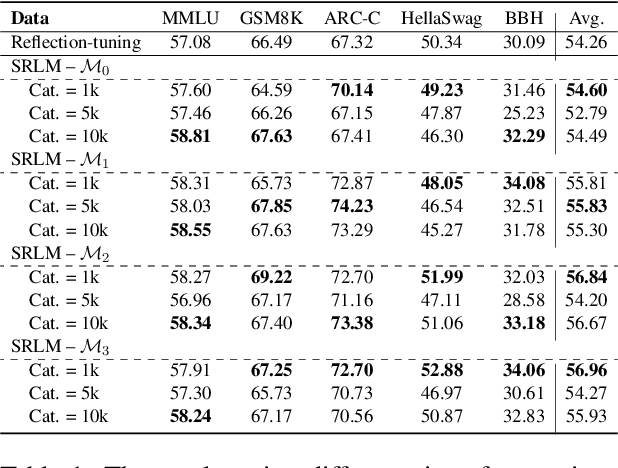


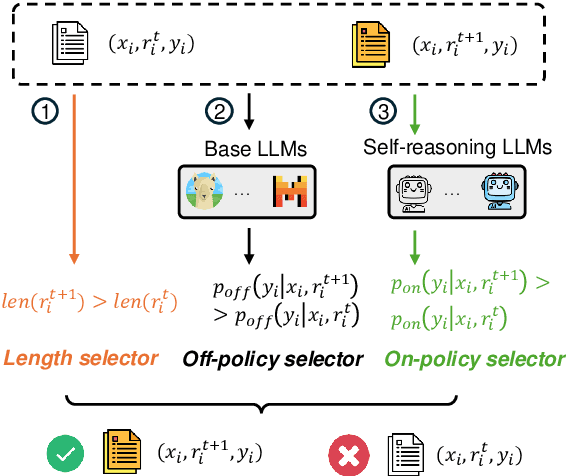
Abstract:Inference-time scaling has attracted much attention which significantly enhance the performance of Large Language Models (LLMs) in complex reasoning tasks by increasing the length of Chain-of-Thought. These longer intermediate reasoning rationales embody various meta-reasoning skills in human cognition, such as reflection and decomposition, being difficult to create and acquire. In this work, we introduce \textit{Self-Reasoning Language Model} (SRLM), where the model itself can synthesize longer CoT data and iteratively improve performance through self-training. By incorporating a few demonstration examples (i.e., 1,000 samples) on how to unfold hidden reasoning chains from existing responses, which act as a reasoning catalyst, we demonstrate that SRLM not only enhances the model's initial performance but also ensures more stable and consistent improvements in subsequent iterations. Our proposed SRLM achieves an average absolute improvement of more than $+2.5$ points across five reasoning tasks: MMLU, GSM8K, ARC-C, HellaSwag, and BBH on two backbone models. Moreover, it brings more improvements with more times of sampling during inference, such as absolute $+7.89$ average improvement with $64$ sampling times, revealing the in-depth, diverse and creative reasoning paths in SRLM against the strong baseline.
Seed1.5-VL Technical Report
May 11, 2025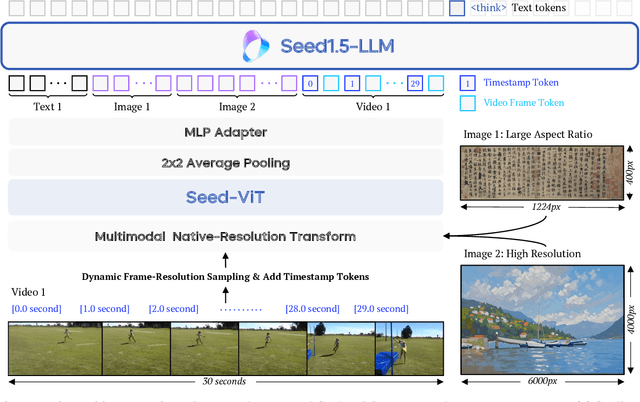


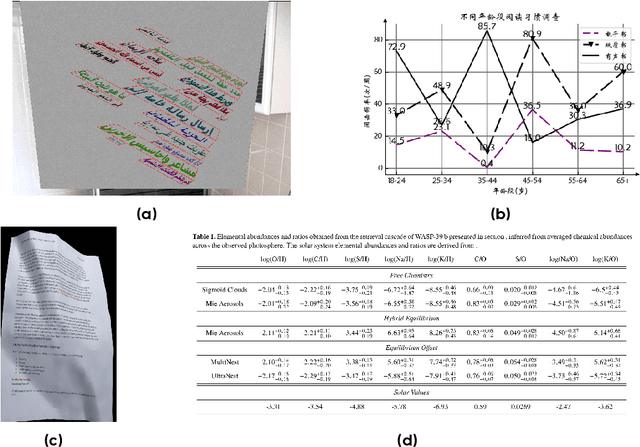
Abstract:We present Seed1.5-VL, a vision-language foundation model designed to advance general-purpose multimodal understanding and reasoning. Seed1.5-VL is composed with a 532M-parameter vision encoder and a Mixture-of-Experts (MoE) LLM of 20B active parameters. Despite its relatively compact architecture, it delivers strong performance across a wide spectrum of public VLM benchmarks and internal evaluation suites, achieving the state-of-the-art performance on 38 out of 60 public benchmarks. Moreover, in agent-centric tasks such as GUI control and gameplay, Seed1.5-VL outperforms leading multimodal systems, including OpenAI CUA and Claude 3.7. Beyond visual and video understanding, it also demonstrates strong reasoning abilities, making it particularly effective for multimodal reasoning challenges such as visual puzzles. We believe these capabilities will empower broader applications across diverse tasks. In this report, we mainly provide a comprehensive review of our experiences in building Seed1.5-VL across model design, data construction, and training at various stages, hoping that this report can inspire further research. Seed1.5-VL is now accessible at https://www.volcengine.com/ (Volcano Engine Model ID: doubao-1-5-thinking-vision-pro-250428)
OTC: Optimal Tool Calls via Reinforcement Learning
Apr 21, 2025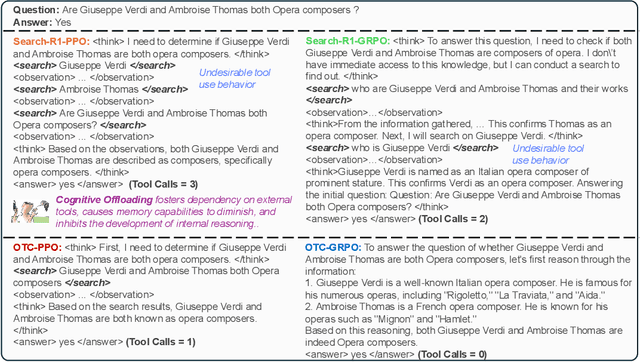
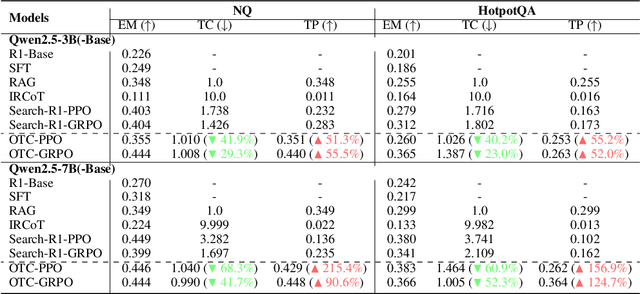

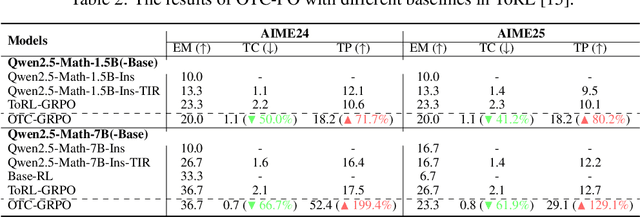
Abstract:Tool-integrated reasoning (TIR) augments large language models (LLMs) with the ability to invoke external tools, such as search engines and code interpreters, to solve tasks beyond the capabilities of language-only reasoning. While reinforcement learning (RL) has shown promise in improving TIR by optimizing final answer correctness, existing approaches often overlook the efficiency and cost associated with tool usage. This can lead to suboptimal behavior, including excessive tool calls that increase computational and financial overhead, or insufficient tool use that compromises answer quality. In this work, we propose Optimal Tool Call-controlled Policy Optimization (OTC-PO), a simple yet effective RL-based framework that encourages models to produce accurate answers with minimal tool calls. Our method introduces a tool-integrated reward that jointly considers correctness and tool efficiency, promoting high tool productivity. We instantiate this framework within both Proximal Policy Optimization (PPO) and Group Relative Preference Optimization (GRPO), resulting in OTC-PPO and OTC-GRPO. Experiments with Qwen-2.5 and Qwen-Math across multiple QA benchmarks show that our approach reduces tool calls by up to 73.1\% and improves tool productivity by up to 229.4\%, while maintaining comparable answer accuracy. To the best of our knowledge, this is the first RL-based framework that explicitly optimizes tool-use efficiency in TIR.
ReTool: Reinforcement Learning for Strategic Tool Use in LLMs
Apr 15, 2025Abstract:While reasoning models (e.g., DeepSeek R1) trained with reinforcement learning (RL), excel in textual reasoning, they struggle in scenarios requiring structured problem-solving, such as geometric reasoning, concise computation, or complex equation solving-areas where computational tools like code interpreters (CI) demonstrate distinct advantages. To bridge this gap, we propose ReTool, which enhances long-form reasoning with tool-integrated learning, including two key features: (1) dynamic interleaving of real-time code execution within natural language reasoning processes, and (2) an automated RL paradigm that allows policy rollouts with multi-turn real-time code execution and teaches the model in learning when and how to invoke tools based on outcome feedback. ReTool employs a systematic training framework, beginning with synthetic cold-start data generation to produce code-augmented long-form reasoning traces for fine-tuning base models. Subsequent RL training leverages task outcomes as rewards to iteratively refine the model's tool use strategy, enabling autonomous discovery of optimal tool invocation patterns without human priors. Experiments on the challenging MATH Olympiad benchmark AIME demonstrate ReTool's superiority: Our 32B model achieves 67% accuracy with 400 training steps, outperforming text-based RL baseline (40% accuracy, 1080 steps) in efficiency and performance. Remarkably, ReTool-32B attains 72.5% accuracy in extended settings, surpassing OpenAI's o1-preview by 27.9%. Further analysis reveals emergent behaviors such as code self-correction, signaling an ''aha moment'' in which the model autonomously masters adaptive tool use. These findings highlight the promise of outcome-driven tool integration for advancing complex mathematical reasoning and offer new insights into hybrid neuro-symbolic systems.
UI-TARS: Pioneering Automated GUI Interaction with Native Agents
Jan 21, 2025Abstract:This paper introduces UI-TARS, a native GUI agent model that solely perceives the screenshots as input and performs human-like interactions (e.g., keyboard and mouse operations). Unlike prevailing agent frameworks that depend on heavily wrapped commercial models (e.g., GPT-4o) with expert-crafted prompts and workflows, UI-TARS is an end-to-end model that outperforms these sophisticated frameworks. Experiments demonstrate its superior performance: UI-TARS achieves SOTA performance in 10+ GUI agent benchmarks evaluating perception, grounding, and GUI task execution. Notably, in the OSWorld benchmark, UI-TARS achieves scores of 24.6 with 50 steps and 22.7 with 15 steps, outperforming Claude (22.0 and 14.9 respectively). In AndroidWorld, UI-TARS achieves 46.6, surpassing GPT-4o (34.5). UI-TARS incorporates several key innovations: (1) Enhanced Perception: leveraging a large-scale dataset of GUI screenshots for context-aware understanding of UI elements and precise captioning; (2) Unified Action Modeling, which standardizes actions into a unified space across platforms and achieves precise grounding and interaction through large-scale action traces; (3) System-2 Reasoning, which incorporates deliberate reasoning into multi-step decision making, involving multiple reasoning patterns such as task decomposition, reflection thinking, milestone recognition, etc. (4) Iterative Training with Reflective Online Traces, which addresses the data bottleneck by automatically collecting, filtering, and reflectively refining new interaction traces on hundreds of virtual machines. Through iterative training and reflection tuning, UI-TARS continuously learns from its mistakes and adapts to unforeseen situations with minimal human intervention. We also analyze the evolution path of GUI agents to guide the further development of this domain.
AutoKaggle: A Multi-Agent Framework for Autonomous Data Science Competitions
Oct 29, 2024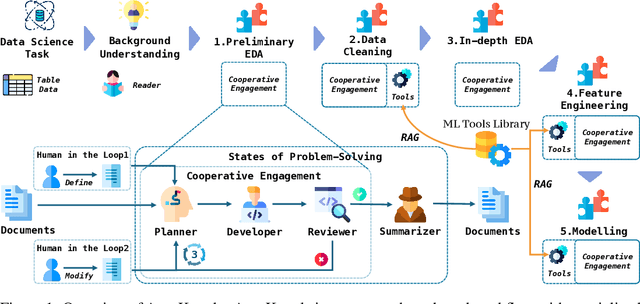



Abstract:Data science tasks involving tabular data present complex challenges that require sophisticated problem-solving approaches. We propose AutoKaggle, a powerful and user-centric framework that assists data scientists in completing daily data pipelines through a collaborative multi-agent system. AutoKaggle implements an iterative development process that combines code execution, debugging, and comprehensive unit testing to ensure code correctness and logic consistency. The framework offers highly customizable workflows, allowing users to intervene at each phase, thus integrating automated intelligence with human expertise. Our universal data science toolkit, comprising validated functions for data cleaning, feature engineering, and modeling, forms the foundation of this solution, enhancing productivity by streamlining common tasks. We selected 8 Kaggle competitions to simulate data processing workflows in real-world application scenarios. Evaluation results demonstrate that AutoKaggle achieves a validation submission rate of 0.85 and a comprehensive score of 0.82 in typical data science pipelines, fully proving its effectiveness and practicality in handling complex data science tasks.
Agents in Software Engineering: Survey, Landscape, and Vision
Sep 13, 2024



Abstract:In recent years, Large Language Models (LLMs) have achieved remarkable success and have been widely used in various downstream tasks, especially in the tasks of the software engineering (SE) field. We find that many studies combining LLMs with SE have employed the concept of agents either explicitly or implicitly. However, there is a lack of an in-depth survey to sort out the development context of existing works, analyze how existing works combine the LLM-based agent technologies to optimize various tasks, and clarify the framework of LLM-based agents in SE. In this paper, we conduct the first survey of the studies on combining LLM-based agents with SE and present a framework of LLM-based agents in SE which includes three key modules: perception, memory, and action. We also summarize the current challenges in combining the two fields and propose future opportunities in response to existing challenges. We maintain a GitHub repository of the related papers at: https://github.com/DeepSoftwareAnalytics/Awesome-Agent4SE.
Concise and Precise Context Compression for Tool-Using Language Models
Jul 02, 2024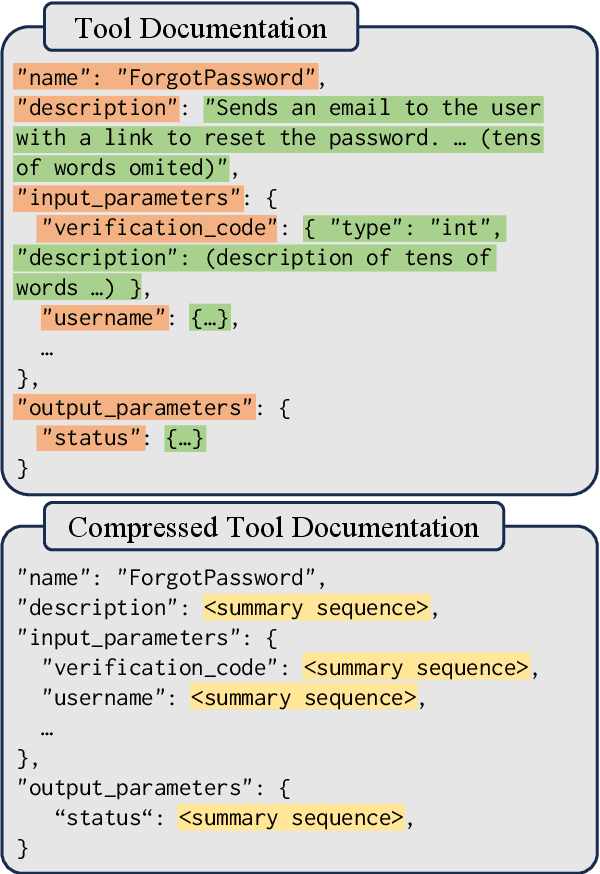

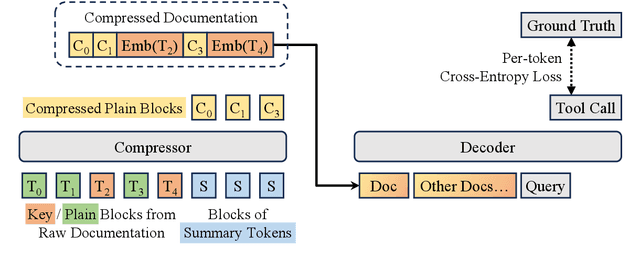

Abstract:Through reading the documentation in the context, tool-using language models can dynamically extend their capability using external tools. The cost is that we have to input lengthy documentation every time the model needs to use the tool, occupying the input window as well as slowing down the decoding process. Given the progress in general-purpose compression, soft context compression is a suitable approach to alleviate the problem. However, when compressing tool documentation, existing methods suffer from the weaknesses of key information loss (specifically, tool/parameter name errors) and difficulty in adjusting the length of compressed sequences based on documentation lengths. To address these problems, we propose two strategies for compressing tool documentation into concise and precise summary sequences for tool-using language models. 1) Selective compression strategy mitigates key information loss by deliberately retaining key information as raw text tokens. 2) Block compression strategy involves dividing tool documentation into short chunks and then employing a fixed-length compression model to achieve variable-length compression. This strategy facilitates the flexible adjustment of the compression ratio. Results on API-Bank and APIBench show that our approach reaches a performance comparable to the upper-bound baseline under up to 16x compression ratio.
CLongEval: A Chinese Benchmark for Evaluating Long-Context Large Language Models
Mar 06, 2024Abstract:Developing Large Language Models (LLMs) with robust long-context capabilities has been the recent research focus, resulting in the emergence of long-context LLMs proficient in Chinese. However, the evaluation of these models remains underdeveloped due to a lack of benchmarks. To address this gap, we present CLongEval, a comprehensive Chinese benchmark for evaluating long-context LLMs. CLongEval is characterized by three key features: (1) Sufficient data volume, comprising 7 distinct tasks and 7,267 examples; (2) Broad applicability, accommodating to models with context windows size from 1K to 100K; (3) High quality, with over 2,000 manually annotated question-answer pairs in addition to the automatically constructed labels. With CLongEval, we undertake a comprehensive assessment of 6 open-source long-context LLMs and 2 leading commercial counterparts that feature both long-context abilities and proficiency in Chinese. We also provide in-depth analysis based on the empirical results, trying to shed light on the critical capabilities that present challenges in long-context settings. The dataset, evaluation scripts, and model outputs will be released.
 Add to Chrome
Add to Chrome Add to Firefox
Add to Firefox Add to Edge
Add to Edge